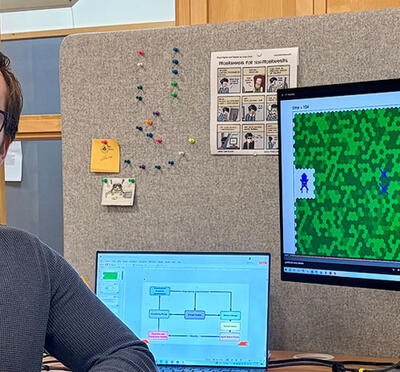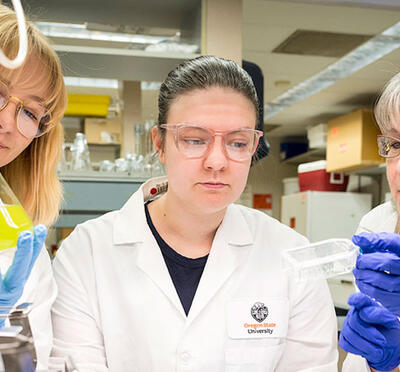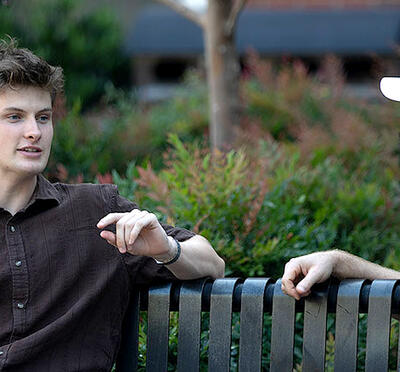Kyle Proctor had no agricultural background before pursuing his doctorate in water resources engineering at Oregon State, yet he soon found himself growing endless rows of plants beneath solar arrays at the university-operated Vegetable Research Farm.
“For the summers of 2019 and 2020, I was essentially a farmer,” Proctor said. “I had thousands of tomatoes and beans growing underneath solar panels. I got to work in the system to see the whole process of farming. That was really valuable.”
A native San Diegan, Proctor was more familiar with the ocean than with open swaths of land. His interest in examining the natural world led him to earn a bachelor’s in environmental studies from the University of San Diego, where he participated in the McNair Scholars Program, which provides research opportunities for undergraduates considering advanced degrees. For Proctor, this experience was fundamental.
“I was studying marine science, and something clicked in my brain: I actually like research!” Proctor said. “I also realized that, although environmental studies is super interesting, I wanted to pivot to engineering.”
Freshly motivated, Proctor stayed on another year at USD to obtain a mathematics minor and complete prerequisite coursework for graduate programs. He also attended a conference for the Society for Advancement of Chicanos/Hispanics and Native Americans in Science, where he had a favorable interaction with an Oregon State representative.
“I actually started applying to Oregon State’s environmental engineering program, but then I saw the water resource engineering program and looked into the professors’ work,” Proctor said. “It was perfect.”
When Proctor began his doctorate, he originally worked on a wastewater treatment project with his co-advisor, Ganti Murthy, professor of biological and ecological engineering. However, the more he learned, the more he gravitated toward water’s global implications. When Proctor found out that 70% of global water resources are used for agriculture, he knew this is where he would plant his research seeds.
“I had no agricultural background, never even had a garden,” Proctor said. “But if that’s where most water goes, I should focus on that.”
Coincidentally, Proctor’s other co-advisor, Chad Higgins, associate professor of biological and ecological engineering, had started working on a project involving agrivoltaics, the use of land to grow crops and generate solar power in tandem. Proctor had already cultivated an interest in the Food-Energy-Water nexus, relevant to Higgins’ work, and he appreciated that solar panels help conserve water.
“A light saturation point occurs when more light won’t contribute to further crop growth; it just leads to more water use,” Proctor explained. “If we know that point, we can strategically capture excess light and use that to produce electricity, saving water. That’s where the water resource engineering piece fits in.”
Proctor worked on the mathematical modeling component of the project, gaining modeling experience for his master’s degree in biological and ecological engineering, which he earned concurrently with his doctorate. For his master’s project, Proctor developed a statistical emulator of crop yields in the United States using a global database of crop modeling simulations and a deep neural network.
For his doctoral research, Proctor explored how his models could be applied to understand natural systems and predict their development. With tomatoes and beans as field-trial crops, he measured variables such as growth, solar radiation, and the effects of weather phenomena.
“We’d see the plants grown in shadier areas were taller and had wider leaves, trying to get out towards sunlight,” Proctor said. “We also measured gas exchange to see how photosynthesis changes in plants in different conditions.”
Proctor’s doctoral work culminated in three papers. The first was a co-authored review of the Food-Energy-Water nexus, which was published in Science of the Total Environment in 2021. That same year, another paper, co-authored with Murthy and Higgins, was published in Sustainability. Examining agrivoltaics on a national scale, the authors concluded that just 1% of U.S. farmland could increase overall solar electricity production in the country by 20%. Proctor’s third paper, pending publication, focuses on a simulation he created using an existing 3D solar radiation model and a crop growth model to determine optimal solar panel placement. Overall, Proctor’s findings offer three main potential benefits of agrivoltaics: saving money, saving water, and saving farmland.
Since graduating with his doctorate in June 2022, Proctor has been working as a senior engineer for Irrigation for the Future, a startup founded by irrigation specialist Marshall English, professor emeritus of biological and ecological engineering. In his role, Proctor supports California almond farmers by running models to calculate optimal water-use productivity.
“I help farmers with irrigation scheduling, providing a weekly estimate of how much they should water their crops to optimize their monetary return,” Proctor said. “I leverage data to help them make more informed decisions.”
Proctor believes his time at Oregon State crucially prepared him for his career. He is grateful to have received the Ron Miner Memorial Scholarship, the American Water Resource Association’s Richard A. Herbert Memorial Scholarship, and the new Bryant-Morgan Scholarship, established by College of Engineering alumnus Mar’quis Bryant-Morgan. Proctor also joined Hydrophiles and maintains membership with Corvallis Climbers of Color.
Finally, Proctor praised the North Willamette Research and Extension Center in Aurora, Oregon, and explained that his professors helped him become more adaptable through research experience, which continually comes in handy.
“Before Irrigation for the Future, I knew very little about almonds,” Proctor said. “But I know how to seek out information necessary to help people make decisions. That’s the idea of a Ph.D. — research, bring information together, and leverage it to do something useful for the world.”



